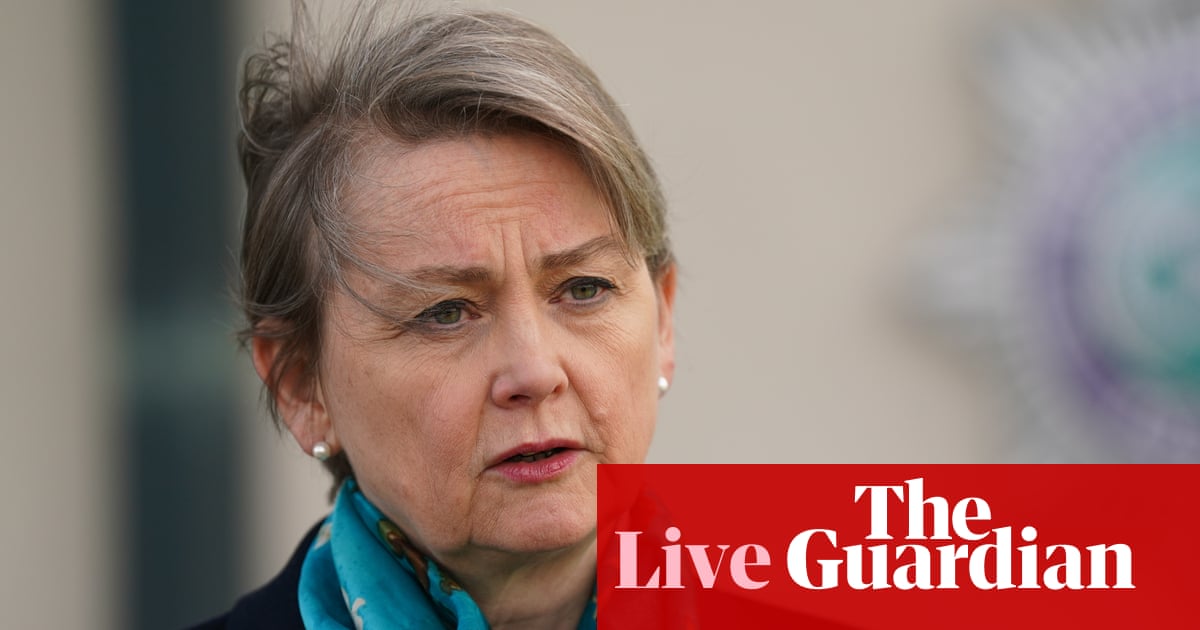Yvette Cooper says it’s ‘unacceptable’ jailed ex-Labour MP still qualifies for parliamentary salary
Good morning. Today the government is publishing its crime and policing bill. As the home affairs commentator Danny Shaw explains in a helpful social media summary, it is a “huge and unwieldy” bill, tackling various Labour law and order priorities, as well as a raft of ones that the last Conservative government was planning to legislate for before the election got in the way.
Most of what is in the bill has already been well trailed. As Peter Walker reports, overnight the Home Office has been highlighting the provisions that will allow the police to search properties for stolen phones or other electronically geotagged items without a warrant.
Yvette Cooper, the home secretary, has been giving interviews this morning, and on the Today programme she had an uncomfortable moment when asked about crime-related loophole not being tackled by the bill. It has emerged that, even thought the MP Mike Amesbury was yesterday sentenced to 10 weeks in jail for assault, he is still being paid his Commons salary. That is because the Independent Parliamentary Standards Authority (IPSA) is in charge of paying MPs and it has to keep giving them their money unless they have been suspended or removed from post.
If the Commons standards committee were to consider Amesbury’s case, he almost certainly would be suspended. But the Commons disciplinary process has not kicked in because the criminal justice process has taken precedence, and Amesbury was only sentenced yesterday. He says he will appeal.
Asked how she felt about Amesbury continuing to receive his salary, Cooper argued that he should resign as an MP. She said:
I think the Runcorn constituents deserve better, and we wanted to see a new MP in place as swiftly as possible. We look forward to Runcorn constituents getting the representation that they deserve from a newly elected Labour MP.
When asked specifically if an MP should continue to get paid while in prison, Cooper replied:
I think everything that’s happened is unacceptable here.
When the presenter, Emma Barnett, asked her again whether she was happy about this, Cooper replied:
You’re asking me about parliamentary rules and procedures, which obviously are separate from those that the government runs. They’re separately ones for parliament.
This is a slightly misleading answer. Disciplinary rules for MPs are a matter for parliament. But a government with a large majority can change those rules quite easily. The fact that this has not happened before is a reflection of the fact that in the past MPs sent to jail have tended to resign immediately, avoiding the situation Amesbury is now in.
I will post more from the Cooper interviews shortly.
Here is the agenda for the day.
9.30am: Keir Starmer chairs cabinet.
10.15am: Steve Reed, the environment secretary, speaks at the NFU conference in London. As Helena Horton reports, he will announce a five-year extension of the seasonal farm worker scheme.
10.30am: Kemi Badenoch gives a speech on foreign policy.
11am: The House of Keys, the Isle of Man’s equivalent of the House of Commons, is due to vote on assisted dying legislation.
11.30am: Downing Street holds a lobby briefing.
11.30am: David Lammy, the foreign secretary, takes questions in the Commons.
Lunchtime: The crime and policing bill is due to be published.
2.30pm: Sir Chris Wormald, the new cabinet secretary, gives evidence to the public administration and constitutional affairs committee.
2.30pm: Senior police officers give evidence to the Commons home affairs committee about last year’s summer riots.
If you want to contact me, please post a message below the line or message me on social media. I can’t read all the messages BTL, but if you put “Andrew” in a message aimed at me, I am more likely to see it because I search for posts containing that word.
If you want to flag something up urgently, it is best to use social media. You can reach me on Bluesky at @andrewsparrowgdn. The Guardian has given up posting from its official accounts on X but individual Guardian journalists are there, I still have my account, and if you message me there at @AndrewSparrow, I will see it and respond if necessary.
I find it very helpful when readers point out mistakes, even minor typos. No error is too small to correct. And I find your questions very interesting too. I can’t promise to reply to them all, but I will try to reply to as many as I can, either BTL or sometimes in the blog.
Key events
Badenoch suggests UK might need to withdraw from some international bodies ‘taken over’ by activists or autocrats
Kemi Badenoch will be giving a speech shortly on foreign policy. CCHQ released a chunk of extracts overnight, and here are the key points.
Twenty years ago, Irving Kristol talked of a conservative being a liberal mugged by reality. And, on foreign policy, that is exactly what I am: a conservative. Not a cosmopolitan internationalist. Not a supra-nationalist. Not a neo-con. But a conservative realist.
The United Kingdom must accept reality. No-one owes us a living. No process is an end in itself. We can no longer hide behind vapid statements that were, at best, ambitious twenty years ago and are now outright irrelevant.
It is time to speak the truth: the world has changed. And we are not ready.
So, we must change too.
The first thing we must define is what we want, and what we must do. A nation state’s primary purpose is to defend its borders, its values and its people. Our national interest is first and foremost to protect our country, to strengthen our country, and to look after ourselves. That means a strong military and a strong economy. That is not a selfish objective. It is realism – because you cannot help others if you cannot help yourself. Strengthening Britain must be the principal objective at the heart of everything we do.
We must stop being naïve about international affairs. We’ve let ourselves be fooled into believing that international law alone can keep the peace. But when faced with a regime with no respect for the law, we need to be realistic.
We can no longer simply put our trust in international partnerships or supranational institutions as ends in themselves. Where these work for us and deliver in our national interest we will embrace them. NATO remains vital for European defence. We should always prioritise closer trading relationships with open economies, and as a trading nation we need to protect the rules that underpin global commerce.
Where international discussions achieve results, like with the AUKUS Partnership or the CPTPP trade deal, we must support them. But “international law” should not become a tool for NGOs and other critics to seek to advance an activist political agenda through international bodies and our domestic courts. And if international bodies are taken over by activists, or by autocratic regimes like China or Russia, we must use our influence to stop them. And if that fails, we will need to disengage.
And there will be painful decisions on government spending. Any country that spends more interest on its debt than on defence, as the UK does today, is destined for weakness.
Amanda Pritchard quits as NHS England chief executive in shock move
Amanda Pritchard is standing down as chief executive of NHS England, in a development that will shock the health service, Denis Campbell reports.
Labour losing support fastest among voters worried over finances, study finds
Labour is losing support fastest among voters who feel economically insecure, according to a report urging Keir Starmer to focus on boosting living standards, rather than on culture wars and immigration. Richard Partington has the story.
This is how Yvette Cooper, the home secretary, is promoting the crime and policing bill on social media.
Communities shouldn’t have to put up with rising town centre crime, antisocial behaviour or persistent serious violence on our streets.
Our Crime and Policing Bill will give police & communities power to take back our streets & town centres and tackle serious violence. pic.twitter.com/eIzae2yEcg
— Yvette Cooper (@YvetteCooperMP) February 25, 2025
Communities shouldn’t have to put up with rising town centre crime, antisocial behaviour or persistent serious violence on our streets.
Our Crime and Policing Bill will give police & communities power to take back our streets & town centres and tackle serious violence.
Tories claim most measures in ‘copy and paste crime bill’ were in their pre-election criminal justice bill
The Conservatives are accusing Labour of introducing a “copy and paste crime bill”. Explaining the term on Sky News this morning, Victoria Atkins, the shadow environment secretary, said:
Of the 35 specific measures in [the crime and policing bill], 21 of them either appeared in our previous criminal justice bill just before the election or we have announced, so of course we will support those measures.
Indeed, the very measure you have just described, the removing the need for a search warrant, we announced that, so I’m delighted that Labour is cutting and pasting from our ideas in order to bring this legislation before parliament, but we will be scrutinising other aspects of the bill.
Cooper avoids saying whether crime and policing bill will lead to increase in overall prison population
The crime and policing bill creates 18 new offences, and includes three measures that could lead to people getting longer sentencing for existing offenders. In her interview on the Today programme, Yvette Cooper, the home secretary, was asked how this was consistent with the Ministry of Justice’s attempts to limit the use of custodial sentences, because the jails are full.
Cooper said that, although the bill will increase sentencing powers in some areas, like child grooming, other measures in it could reduce the jail population. She said:
There are some of the measures that we think also by taking early prevention action actually can help prevent crimes escalating and can prevent prison sentences.
Asked if the bill would lead to an overall increase in the prison population, Cooper sidestepped the question.
Yvette Cooper says it’s ‘unacceptable’ jailed ex-Labour MP still qualifies for parliamentary salary
Good morning. Today the government is publishing its crime and policing bill. As the home affairs commentator Danny Shaw explains in a helpful social media summary, it is a “huge and unwieldy” bill, tackling various Labour law and order priorities, as well as a raft of ones that the last Conservative government was planning to legislate for before the election got in the way.
Most of what is in the bill has already been well trailed. As Peter Walker reports, overnight the Home Office has been highlighting the provisions that will allow the police to search properties for stolen phones or other electronically geotagged items without a warrant.
Yvette Cooper, the home secretary, has been giving interviews this morning, and on the Today programme she had an uncomfortable moment when asked about crime-related loophole not being tackled by the bill. It has emerged that, even thought the MP Mike Amesbury was yesterday sentenced to 10 weeks in jail for assault, he is still being paid his Commons salary. That is because the Independent Parliamentary Standards Authority (IPSA) is in charge of paying MPs and it has to keep giving them their money unless they have been suspended or removed from post.
If the Commons standards committee were to consider Amesbury’s case, he almost certainly would be suspended. But the Commons disciplinary process has not kicked in because the criminal justice process has taken precedence, and Amesbury was only sentenced yesterday. He says he will appeal.
Asked how she felt about Amesbury continuing to receive his salary, Cooper argued that he should resign as an MP. She said:
I think the Runcorn constituents deserve better, and we wanted to see a new MP in place as swiftly as possible. We look forward to Runcorn constituents getting the representation that they deserve from a newly elected Labour MP.
When asked specifically if an MP should continue to get paid while in prison, Cooper replied:
I think everything that’s happened is unacceptable here.
When the presenter, Emma Barnett, asked her again whether she was happy about this, Cooper replied:
You’re asking me about parliamentary rules and procedures, which obviously are separate from those that the government runs. They’re separately ones for parliament.
This is a slightly misleading answer. Disciplinary rules for MPs are a matter for parliament. But a government with a large majority can change those rules quite easily. The fact that this has not happened before is a reflection of the fact that in the past MPs sent to jail have tended to resign immediately, avoiding the situation Amesbury is now in.
I will post more from the Cooper interviews shortly.
Here is the agenda for the day.
9.30am: Keir Starmer chairs cabinet.
10.15am: Steve Reed, the environment secretary, speaks at the NFU conference in London. As Helena Horton reports, he will announce a five-year extension of the seasonal farm worker scheme.
10.30am: Kemi Badenoch gives a speech on foreign policy.
11am: The House of Keys, the Isle of Man’s equivalent of the House of Commons, is due to vote on assisted dying legislation.
11.30am: Downing Street holds a lobby briefing.
11.30am: David Lammy, the foreign secretary, takes questions in the Commons.
Lunchtime: The crime and policing bill is due to be published.
2.30pm: Sir Chris Wormald, the new cabinet secretary, gives evidence to the public administration and constitutional affairs committee.
2.30pm: Senior police officers give evidence to the Commons home affairs committee about last year’s summer riots.
If you want to contact me, please post a message below the line or message me on social media. I can’t read all the messages BTL, but if you put “Andrew” in a message aimed at me, I am more likely to see it because I search for posts containing that word.
If you want to flag something up urgently, it is best to use social media. You can reach me on Bluesky at @andrewsparrowgdn. The Guardian has given up posting from its official accounts on X but individual Guardian journalists are there, I still have my account, and if you message me there at @AndrewSparrow, I will see it and respond if necessary.
I find it very helpful when readers point out mistakes, even minor typos. No error is too small to correct. And I find your questions very interesting too. I can’t promise to reply to them all, but I will try to reply to as many as I can, either BTL or sometimes in the blog.











